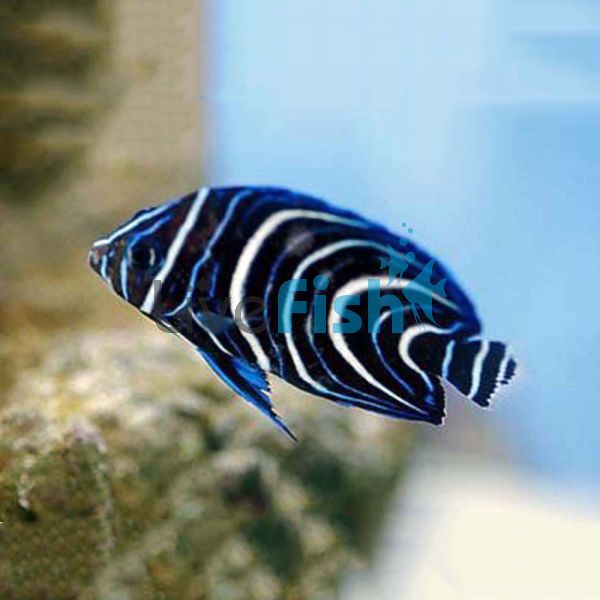Angelfish Koran - Medium (Juvenile)
This Angelfish is also known by the name Semicircle Angelfish, the name describes one of the juvenile’s semi-circled-shaped white stripes, the one that is near the back of its body near the tail fin.
The juvenile Koran Angelfish looks very similar to a juvenile Emperor Angelfish, which are also black with blue and white with the white C-shaped stripe near their tails, but it also has irregular light blue circles on their dorsal and anal fins which the Koran Angelfish juveniles don’t.
Koran Angelfish Juvenile
This Angelfish is also known by the name Semicircle Angelfish, the name describes one of the juvenile’s semi-circled-shaped white stripes, the one that is near the back of its body near the tail fin.
The juvenile Koran Angelfish looks very similar to a juvenile Emperor Angelfish, which are also black with blue and white with the white C-shaped stripe near their tails, but it also has irregular light blue circles on their dorsal and anal fins which the Koran Angelfish juveniles don’t.
When the fish matures its colouration and pattern change and so the Semicircle reference in the name becomes less obvious. They start to change colour and pattern when they are between 8-16cm long.
When they are fully grown these Angelfish can get to 38cm in length and so a large tank is needed for them.
As juveniles these fish make good community fish, but as they mature they become less tolerant of other Angelfish and fish that are of a similar shape.
Even as a juvenile these fish should be added to the tank last as they will bully smaller peaceful fish and attack other Angelfish that are introduced to the tank after them.
The Koran Angelfish is found in various locations throughout the Indo-Pacific region.
Tank Recommendations for Juvenile Koran Angelfish
You can keep a single juvenile Koran Angelfish in a 135 gallon (522 l) tank. It will need a very large tank to reach its full adult size and bright colouration, between 225 to 275 gallons (852 to 1041 l). A larger sized tank will encourage proper adult colouration, reduce stress and illness, and have a longer lifespan.
You should ensure that the tank is at least 6 months old to give algae time to get established on a live rock before adding the Koran Angelfish to the tank, so there are plenty of algae for them to graze on.
These angels will appreciate it if you arrange rocks into cave-type formations to give them several hiding places so that they feel safe.
Suitable Tank Buddies
For a fish-only tank, the Koran Angel has attitude even as a juvenile, so they need to be added to the tank last. They “don’t play nice with others,” bullying smaller peaceful fish like blennies, clownfish, etc. They will also attack other Angelfish.
Usually Compatible
You can keep these fish with other aggressive fish like Dottybacks, Damselfish, 6-Line & 8-Line Wrasses, and Starfish.
Sometime Compatible
These Angelfish when they are juveniles are more compatible with other fish than when they mature. As juveniles, they are normally okay to keep with Gobies, Dartfish, Fairy Wrasses, larger Wrasses, Tangs, and other types of large Angelfish but keep an eye on them.
Rarely Compatible
As Juveniles, the Koran Angelfish shouldn’t be kept with slow swimmers like Seahorses, Pipefish, or Mandarins as these Angelfish are aggressive feeders and so will prevent the slower fish from being able to feed properly.
Feeding Your Juvenile Koran Angelfish
These fish are omnivores and in the wild will eat sponges, tunicates, algae, and other encrusting animals when they are eating the algae. In the Aquarium you should ensure that you feed them a varied diet that includes flake and pellet foods. They will also eat live foods like brine and mysis shrimp and of course algae growing on live rock in the aquarium.
| Scientific Name | Pomacanthus semicirculatus |
|---|---|
| Care Level | Moderate |
| Common Names | Koran Angelfish, Semicircle Angelfish, Semicirculatus and Half-Circle Angelfish. |
| Diet | Omnivore |
| Fish Family | Pomacanthidae |
| Lifespan (years) | 20 |
| Max. Length (cm) | 38 |
| Min. Tank Volume (l) | 852 Litres |
| Origin | Indo - Pacific |
| Reef Safe | Yes |
| Sociability | Semi-aggressive |
| Venomous | No |
| Water Conditions | 72-78° F, dKH 8-12, pH 8.1-8.4, sg 1.020-1.025 |




